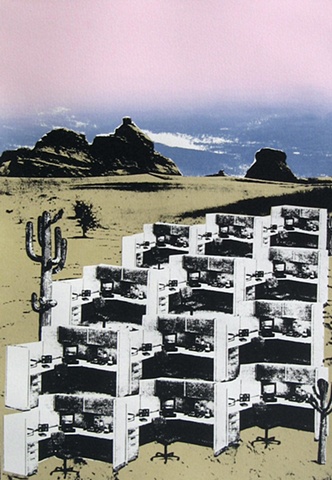The Everyday Scenario Survival Handbook
HOW TO SURVIVE THE DAILY MONOTONY OF OFFICE CUBICLE LIFE…
1. An essential tool for surviving a cubicle is a small radio. Not only does it allow for monotonous tasks to become manageable and makes time to go by a little faster but it is also good for current events, introduces topics for small talk, and allows for a little bit of chair-dancing when no one is looking. The station you choose is essential. Look for one with as little commercial time as possible. Talk time needs to be limited but enough to give you news updates, celebrity gossip, and weather forecasts as this is essential for small talk with co-workers (many seem to choose 104.5 fm as their favourite source but variety dwindles after repetitive listening).
2. When working on the computer many people do a little internet surfing at some point during the day. This is very common and essential to survival. A common practice is to search on a maximized screen and when you hear footsteps approaching to minimize it and go back to work stuff on your screen. The problem with this is no matter how alert you try to be, the person approaching can always see you minimize your screen and knows you were doing something you were not supposed to do. The better approach is to have many screens open on your computer (in the restore down mode) so that it is less obvious that you are surfing because it is smaller and harder to read from a distance and the transition from surf material to work is much faster.
3. When dealing with big piles or repetitive work it is best to split up the task into mindless parts rather than doing all the steps for one thing at one time. The assembly line method works well if it is split up properly. One way is to divide the task into paper work and digital work and have the points be self corrective so that you can't forget a step because the end requires all parts obviously.
4. When dealing with a cubicle it is also essential to keep all work supplies hidden to a certain degree as there are many sticky fingers. Label your supplies (a staple especially should have your full name and possibly a caption saying "touch and die" depending on the strength of sticky fingers).
5. Also there is a certain relationship between the person in the cubicle and the person in the neighbouring cubicle. For example, when someone sneezes, the person whose cubicle overlooks the sneezer is responsible for the "bless you" rhetoric. Others who share the paneled side of the cubicle with the sneezer are not relied on for response.
6. Another important factor is food. Food is a really good topic of conversation when you have nothing else to say, but it is also a good way to suck up to co-workers. Food in any state is good to bring into work, whether it is a botched recipe, or party leftovers, it makes no difference. At the end of the day it will usually be eaten and is a very good thing for conversations which can be built on later and will create a very sharing atmosphere.
Source: Clare Zdichavsky
